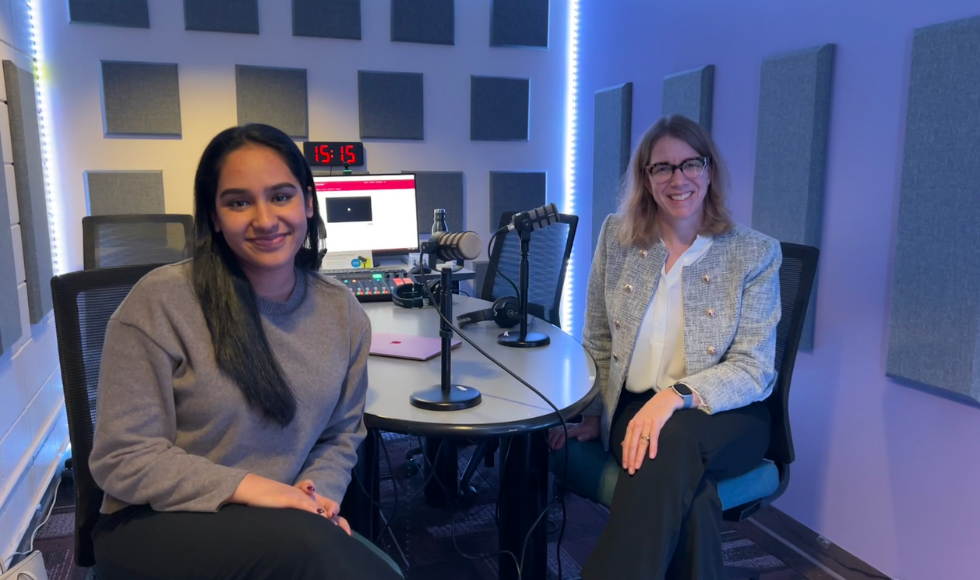Science student’s podcast delves into women’s health

Nidhi Malhotra hosts kinesiologist and Dean of Science Maureen MacDonald on her podcast, Well-being Made Simple
“Loving what you do is how you push through the lows, false starts and dead ends that come with research or working on any major project.”
That’s what Health Sciences instructor Kristina Trim tells her students in Building Undergraduate Research Capacity, an elective open to all third- and fourth-year students.
The course helps students discover what they truly love doing, Trim says. As she tells her students, it’s passion that fuels researchers in their lifelong pursuit of answers and solutions.
In week three, students start working on their passion projects. Students can pick any project they want. There’s no handout listing pre-approved projects.
And Trim doesn’t offer up hints or examples from previous classes. She doesn’t talk about the student who wrote a book of poetry or the other student who created infographics about Nobel Prize winners, sent the winners their infographics and got back notes of thanks and congratulations for a job well done.
The passion project is worth 25 per cent of the students’ final grade.
“That’s just enough to make them nervous and take it seriously,” Trim says. But the marks aren’t the point. The project is meant to engrain intellectual play as a lifelong habit.
“Everyone needs a chance to play. This course gives students a sandbox.”
It’s also a confidence booster.
“It’s not enough for us to show students what to do. We have to help students believe they can do it.”
Self-efficacy — the belief in our capacity to act in the ways necessary to reach specific goals — is an essential life skill, Trim says.
Students have nine weeks to work on their projects. They check in with Trim and update their classmates. The course wraps up with a trade show where they show off their work. Trim makes the rounds and asks each student two questions: What did you learn? And would you do it again?
It was an emphatic Yes from Nidhi Malhotra. In fact, the third-year Life Sciences student is continuing with her podcast even though she’s done the course.
She’d originally pitched the idea of an entire program focused on women’s nutritional health. She became interested in the field of study while working as a research volunteer in the Mood Disorders program at St. Joseph’s Healthcare Hamilton.
“That’s where I discovered how lifestyle changes, especially in nutrition, can significantly affect the severity and symptoms of mental illness.”
Malhotra’s program would explore the effects of different foods on the body with an emphasis on gut health. She set out to close what seemed like a significant gap between the research and what women knew about the issue.
It was a big and bold idea. But maybe a little too big and bold to pull off over nine weeks.
“Nidhi wanted to do the world,” says Trim, who suggested starting with a — still ambitious, yet doable — podcast series on women’s health.
Malhotra is grateful for the advice and guidance. “Dr. Trim was so incredibly helpful and supportive from start to finish.”
Her podcast, Well-being Made Simple, helps women make informed decisions about their nutrition, gut health and hormonal imbalances.
“The overarching mission is to empower women and help them make conscious decisions that positively influence their health and well-being.”
She reached out to leading researchers at McMaster and invited them to appear on her show. Early guests have already included Biochemistry & Biomedical Science professor Deborah Sloboda, Canada Research Chair Stuart Phillips and Faculty of Science Dean Maureen MacDonald.
So what did Malhotra learn through her passion project? Collaboration is key: You’ll always do better by working together so surround yourself with enthusiastic, dedicated and creative people.
She found that and more with a team of six science students she’d met in her courses and outside the classroom.
“They’re the reason the podcast’s been successful and such a satisfying project to work on,” says Malhotra.
The show, recorded in the podcast studio at the Lyons New Media Centre, is shoring up Malhotra’s communication skills. She delves into serious science with her guests, working to stay focused on making the research accessible, relevant and interesting to a general audience.
And the podcast is pushing Malhotra out of her comfort zone.
“Intentionally making myself uncomfortable is one of my strategies for personal growth. I was so nervous during my first interview. But with each subsequent episode, I’ve become more comfortable and confident. The support from my team and Dr. Trim, along with the positive responses from those I’ve connected with, keep me excited about the journey ahead.”
Trim is impressed — but not surprised — by the success of Malhotra’s passion project.
“Students with drive and originality of thought are few and far between. Nidhi has both, along with an amazing personality.”


